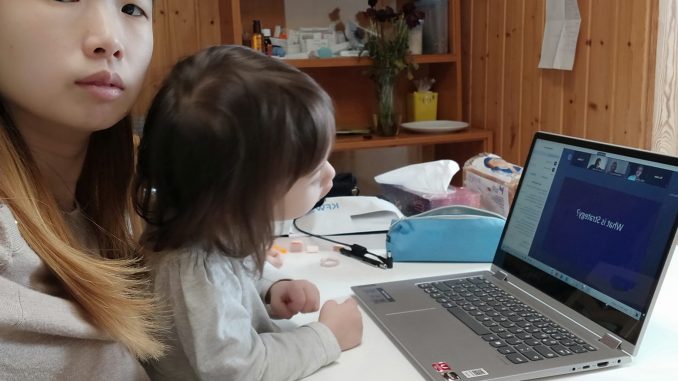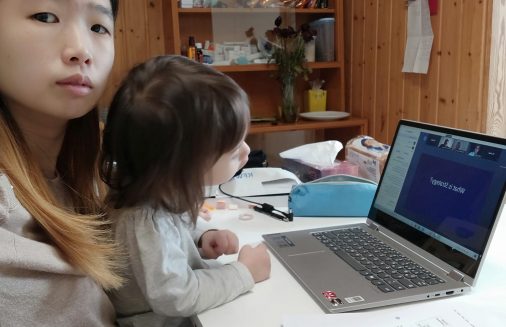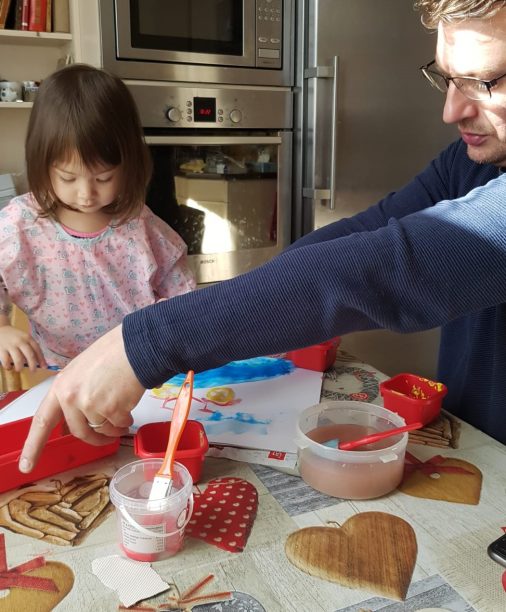

To say that being a work-from-home parent during the coronavirus crisis is not easy would be an understatement.
During “normal times”, parents, especially mothers, already work double-shifts – 1st shift: work (or for me, school), 2nd shift: housework and childcare. The availability of childcare services takes a large burden off the shoulders of parents. Now that schools and kindergartens are closed and that the “normal day” workloads haven’t really decreased (just shifted home), parents find themselves bearing the full blow of the lack of childcare support. What this means is that if parents used to have 7-9 hours or more of support from the school/kindergarten, this is the number of hours of work that’s being transferred back to parents.
It may seem great to be able to spend a lot more time with the family. However, that’s only the case when you don’t have any other work to do. Even so, it’s super exhausting!

As a parent of an almost-three-year-old, you can forget about doing any sort of meaningful work throughout the day. At this age, the child needs to be supervised, entertained, taught, comforted, changed, and fed. Mealtime is a job of its own because of the amount of time and effort it uses up. Any kind of mealtime involves pre-production (planning, shopping), production (preparation, cooking), execution (all 9 influencing techniques to convince the “client” to eat, spoon-feeding, picking up dropped utensil for the 9th time,) and post-production (cleaning up of tables, floors, utensils, face, change of clothes). If you are lucky, you get a 1-2 hours break between 7.00 a.m. and 8.30 p.m. daily and the rest of the time is split between sleep, work/class preparation/assignments, and other miscellaneous tasks.
Splitting hours with your partner is definitely an option and theoretically, it could be done 50-50. But even negotiating the split is stressful. As Nan Krafft puts it, “It’s like fighting about which movie you’re going to watch but with your job and your ego and your mental wellness on the line.” Not everyone has the privilege of support like me, where my husband takes care of our daughter while I attend online classes or spend the afternoon working on my assignments and my mother-in-law prepares dinner. Even when you do have support, there’s always the feeling of guilt towards both family and work teams (is this a mother thing or do fathers feel this too?). As my friend Li Ling puts it, when this self-isolation is over “I would like to hire a babysitter for 24 hours. My sanity went missing and I need to look for it.”
This post goes out to other struggling parents out there. If you’re finding it hard to find your balance in this new arrangement, know that you’re not alone. The most valuable advice I’ve received so far from a parents’ group that I’m in is, to be honest about your challenges during these times, communicate it with your team members, and work out an alternative. Accept that you can’t do everything expected of you under these circumstances. Go easy on yourself and do what it takes to stay sane, even if it means letting the kids watch a bit more TV and eat frozen food. They. Will. Survive.
If you find yourself in a better position than your colleagues who are also parents, you can help makes things easier for them. If you’re able to do so, be flexible with work division (e.g. take on a bit more work – parents aren’t lazy, they are just in a difficult position right now), meeting times (e.g., evenings or maybe when the child is sleeping), and timelines. Every parent has a different arrangement and challenges, so do ask, be flexible, and show some solidarity.
As tough as it is, I’m grateful for what I have – my family, a roof over our heads, my teammates who agree to have meetings at 1.30 p. m. when my child is asleep, to ESMT (Per, Michal, Agnes) who accommodated me retaking the exam when my husband was really ill last week.
Spare a thought for parents who may not have someone to share the load with, people who work in healthcare who put their lives on the line for others, and people whose livelihoods are affected by the movement restriction.
“Be kind, for everyone you meet is fighting a hard battle.” This holds true in normal times but even more relevant in these times that we are living in. More than ever, we need to show support rather than judgment.
